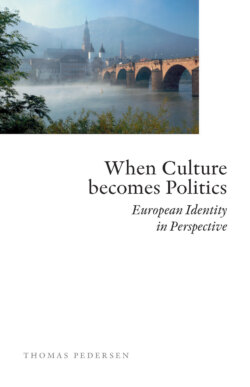Читать книгу When Culture Becomes Politics - Thomas Pedersen - Страница 4
На сайте Литреса книга снята с продажи.
PREFACE
ОглавлениеThe first seeds of inspiration for this book were in a sense sown in 1980 on the Altiplano of Bolivia. I was spending some time in Latin America as a kind of existential journey. One day I reached for a book to read and picked up a slim, second-hand volume I had bought in a marketplace along the way to Bolivia. It was a book on personalism by Emmanuel Mounier. This book with its deep, philosophical interest and quite original conception of individuality spurred me on in later years pushing me in the direction of theoretical debates and inter-disciplinary research. My early academic career went in a different direction though, but I subsequently returned to the issues raised by Mounier. My interest in philosophy was recently reawakened in connection with my research on European identities and European culture. I was puzzled by the way culture tended to be defined – unquestioningly – in collectivistic and holistic terms. I had to ask myself the question: Is not culture increasingly a matter of personal – in part philosophical – choice and individual expression? If so, this also pointed towards a new personalized understanding of nationality.
The book was written in the most inspiring of settings: Most of it was written in Estonia, the crossroads between East and West and a window on the new Russia. It immediately raised the question of whether Russia belongs to Europe. Having embarked upon the analysis of European identity, I soon discovered that the problems looked different from the perspective of the new Europe than from Copenhagen or Bruxelles. To be able to live and work in the Baltics for an extended period has been a great opportunity for me, not only in personal but also in professional terms. Politically and economically Western, Estonia’s culture represents one of the rare plants in the European garden. The Estonian language forms part of the Finnish-Ugrian language group, and apart from Finnish and Hungarian, it has no linguistic family in Europe. For a West European it is a very difficult language to learn. It is however also a very charming language, illustrating the richness of European diversity. And yet, even Estonian carries the luggage of the European cultural legacy: “Naturalism” is “naturalism” – in Estonian as well as in English.
Let me take this opportunity to thank my colleagues at Tartu University and Audentes International University in Tallinn, who provided me with excellent working conditions and also helpful comments, and who showed admirable patience. I am also grateful for being granted leave from my position as an associate professor at the Department of Political Science at the University of Aarhus, Denmark. Although in the main – and in keeping with its tenets – this book is very much an individual product, testifying to the continuing existence of freedom of expression within our embattled universities, I have benefited from useful discussions with, among others, associate professor Per Mouritzen, University of Aarhus, Dr Maurice Fraser, the London School of Economics, and Dr James Hughes, also from the London School of Economics. I moreover received helpful written comments from referees. The responsibility for the content of the book and its conclusions remains, however, entirely my own. Let me also say a word of thanks to the various student assistants and secretaries, and not least to my publishers at Aarhus University Press, who along the way provided indispensable help, and whose professionalism and patience in the face of academic delay often impressed me. Finally, thanks to my two children, Ida and Simon Emil, who provided unflinching support and encouragement along the sometimes bumpy road towards publication of this work.
Thomas Pedersen,
Tallinn,
September 2008
